A new 40-piece light orchestra, the Pyramid Players, has launched at the Stockport Plaza. Greta Simpson goes behind the scenes at their first ever performance
Where would you assume a new orchestra was being launched in Manchester? Ancoats, Didsbury, Altrincham? Probably not Stockport; definitely not nextdoor to the Merseyway Centre and round the corner from RedRock, which won the prize for the worst new building in Britain in 2018.
But the 40-piece Pyramid Players – named after the iconic Co-op pyramid, crown jewel of the M60 since 1992 – are doing just that.
“My gut feeling is that it’ll work very well, but that remains to be seen,” says founder John Wilson via Zoom. It’s three days before the inaugural performance. Wilson, himself a violinist, speaks about the project measuredly, quietly confident but also, as I later discover, rigorously organised.
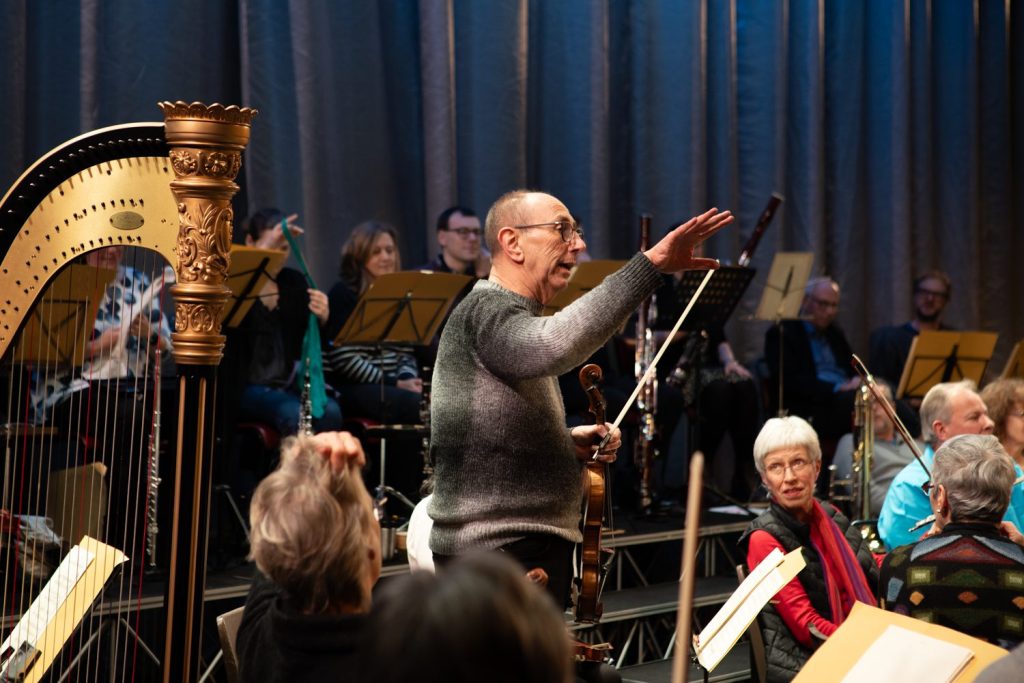
His plan is modelled on a ‘play day’ held by the Light Music Society: an informal event where players turn up in the morning, rehearse together for a few hours, and open the doors to the public for a concert in the afternoon, a slot that avoids competing for audiences on a Friday or Saturday night.
He began laying plans and recruiting players for the project last October, a quick turnaround to find dates where 40 players are available, but Wilson says it’s been straightforward: “It’s been easy, I’ve been really encouraged by the way that the idea’s been received by the players. I think almost everyone I’ve invited has been very keen to join in.
“We’re carving a new audience out for ourselves. It’s nice that we can complement other groups rather than compete with them.”
Who is the audience that he hopes to reach? “I think there are a lot of people who would enjoy an orchestral concert but are put off by their serious nature. There is an appetite for tuneful light music, the type that used to be broadcast all the time on the BBC before the pop movement took over. People enjoy it!
“But it’s a sort of music that fell out of fashion in broadcasting. I think there’s an appetite to rediscover it now.”
There is talk of longer programmes in future but Wilson says this lower-commitment format will help get the group off the ground: “A lot of these players who’ll be there on Sunday are heavily committed with other groups. This way, they can dip their toe in the water and see how they like it.”
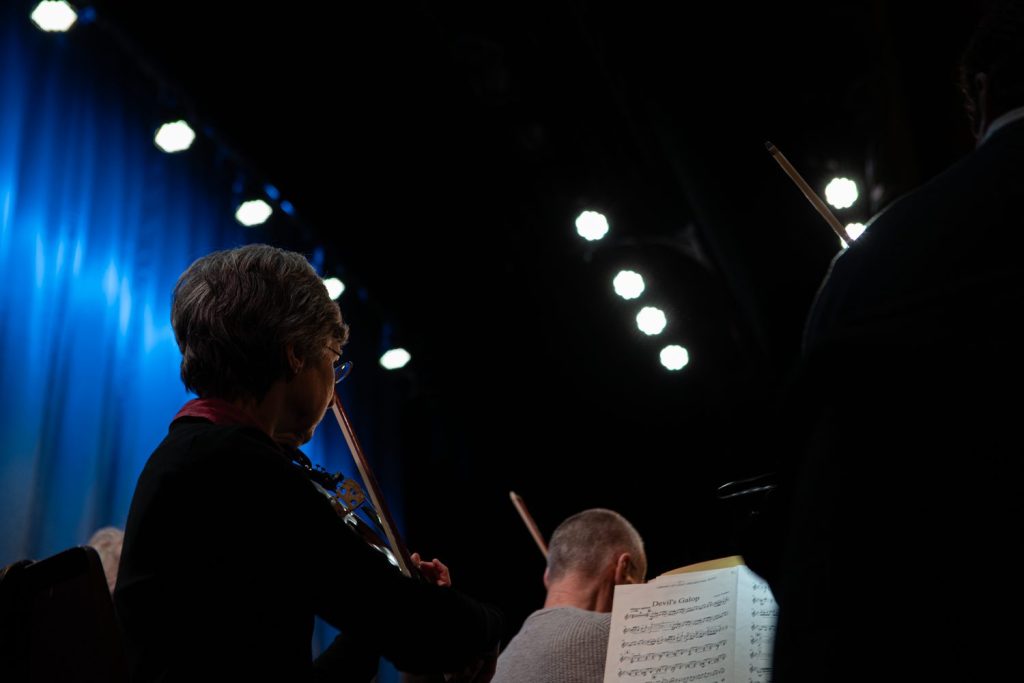
Light music refers to the shorter, more crowd-pleasing form of classical music that was popular in Britain up to and around the mid 20th century. Originating in the seaside and hotel orchestras of the late Victorian era, it was among the first music to be broadcast on BBC radio in the 1920s. Its memorable melodies have been used prolifically as theme music, often evoking nostalgia for a bygone era; see Desert Island Discs, the Archers and the Shipping Forecast on BBC Radio 4.
It formed part of the soundtrack to British life for a time, and despite falling out of favour in the 1960s, it remains beloved today among those who grew up listening to it – and is attracting new audiences too.
Blood, toil, tears…
I join the Pyramid Players at 2pm on the day of the concert. The afternoon rehearsal begins with Eric Coates’ Calling All Workers, the signature tune for the radio programme Music While You Work which ran from 1940 until 1967. Originally conceived with Britain’s Home Front in mind, the music for the programme had to conform: consistent volume, nothing lethargic, and a melody that could be heard on the factory floor, to which workers could whistle or sing.
You can see why Coates’ piece was the theme tune: it bursts into life with triumphant brass and sweeping strings whose melody teems with optimism: you can practically see the black-and-white cinefilm showing streams of smiling women with their hair in rollers pouring into factories; practically feel Churchill’s piercing gaze beaming down on you from a poster; ‘blood, toil, tears and sweat’. Complete with a marching percussion sweeping it all along at a bracing pace, it’s lyrical, fluid, and has that which this genre prizes above all else – an irresistible melody to which you cannot help but hum along.
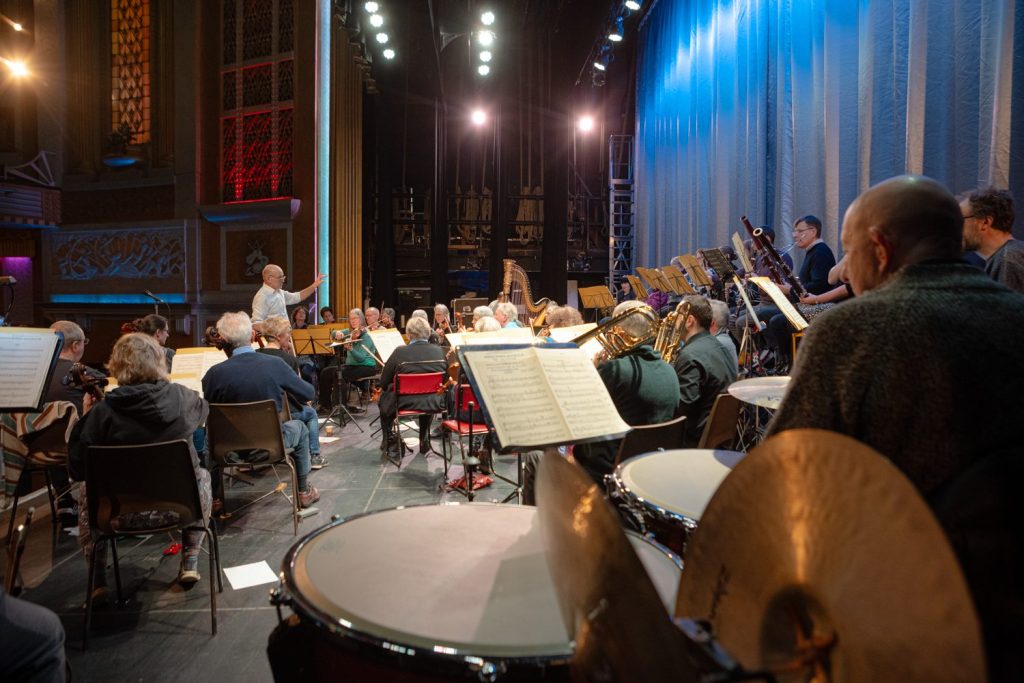
Not all of the pieces are quite as stubbornly cheerful: the slower pieces are lushly orchestrated, with great flourishes of strings and harp and swooping melodies destined to get stuck in your head. There is real feeling here: joy, humour, melancholy, gravitas. Light music may be simpler, more accessible and less serious than its ‘proper’ classical cousin, but its popularity and resonance are not so easily dismissed.
Of the music selection, Wilson says: “I wanted things that people would warm to hearing live in concert; things that the audience would know.”
In rehearsal, the pieces fly by. The conductor, Nick Simpson, is exacting and precise with the orchestra – if something is amiss, he will cease playing with a wave of his arms. But he is also forthcoming in his praise: “Superb, woodwind”; a “that is fabulous” as the orchestra perfects the technically demanding tempo of Pizzicato Tango; a roar of “EXCELLENT!” over the swell of Robert Farnon’s Portrait of a Flirt.
There is a familiarity present alongside the sense of focus on the task. Simpson is by turns cajoling, cracking jokes – his comment “I think we should play this faster” after running through the fastest piece on the roster, the Devil’s Galop, is met with groans – authoritative but still at ease with the players, who are in turn at ease with each other. It turns out that music in Manchester is a small world, so many of them have played with each other before. It might be the Pyramid Players’ first rehearsal, but from the friendly atmosphere, and how efficiently they work, it’s hard to tell.
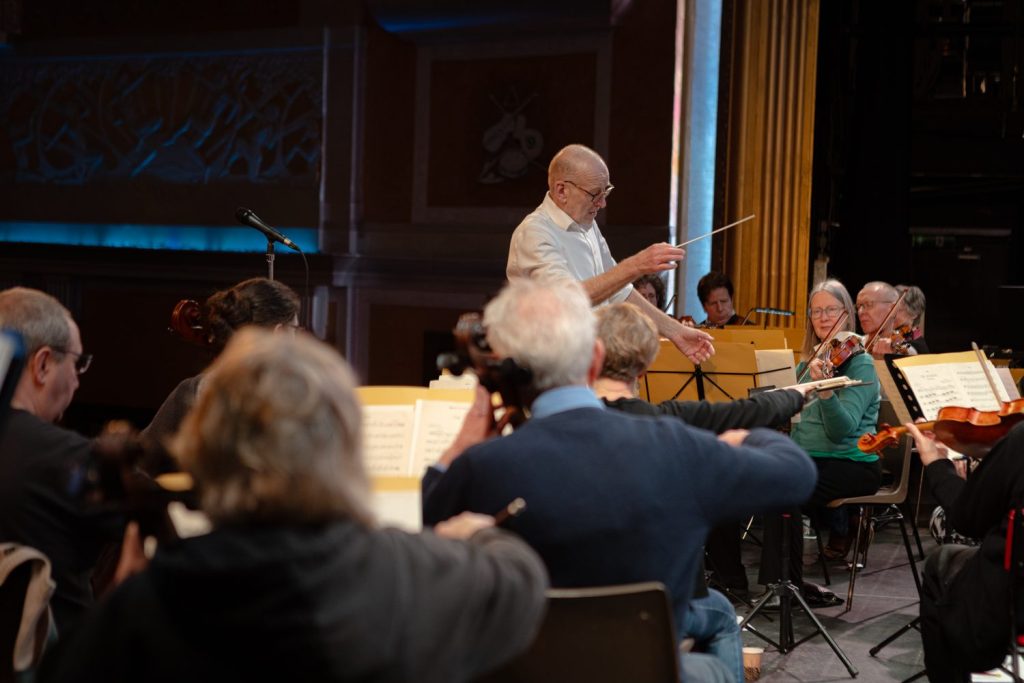
Rehearsal wraps up just after 3pm, and Wilson stands to talk to the players before they disperse. He dispenses effusive thankyous and praise to everybody involved – “the playing quality will be terrific, I’m completely convinced” – and outlines ideas for the next concert, already on the books at the Plaza for September. Two rehearsals this time, then a longer concert, to justify a slightly higher ticket price? Entrance for this first concert cost just £7 per adult.
Wilson is bankrolling the project so far, apart from a £500 grant received from the Greater Manchester Town of Culture fund. Hosting the concert at the Plaza is helping, too, as they manage ticket sales and publicity. Only two of the players are being paid for their time – harpist Maxine Molin and the leader Matthew Chadbond – but the orchestra will be self-funded, Wilson says, promising to provide the players with a financial statement detailing the cost of the concert and where ticket revenue will be spent.
Stockport on the up
Besides the project itself, you can tell the venue means something to him. The Plaza’s auditorium is truly amazing, and Wilson himself was involved in the campaign to rescue it back in the late 1990s. It was built in 1932 and is one of the last remaining ‘super cinemas’ in the country still serving its original purpose. Outside, the works at the bus station have made Mersey Square a mess of ripped-up concrete and orange barriers; inside is another world. Gilt-embossed everywhere, Grecian friezes of dancing maidens, hushed and cavernous as a cathedral, ringing with Art Deco optimism, everything bathed in a pink and cerulean glow.
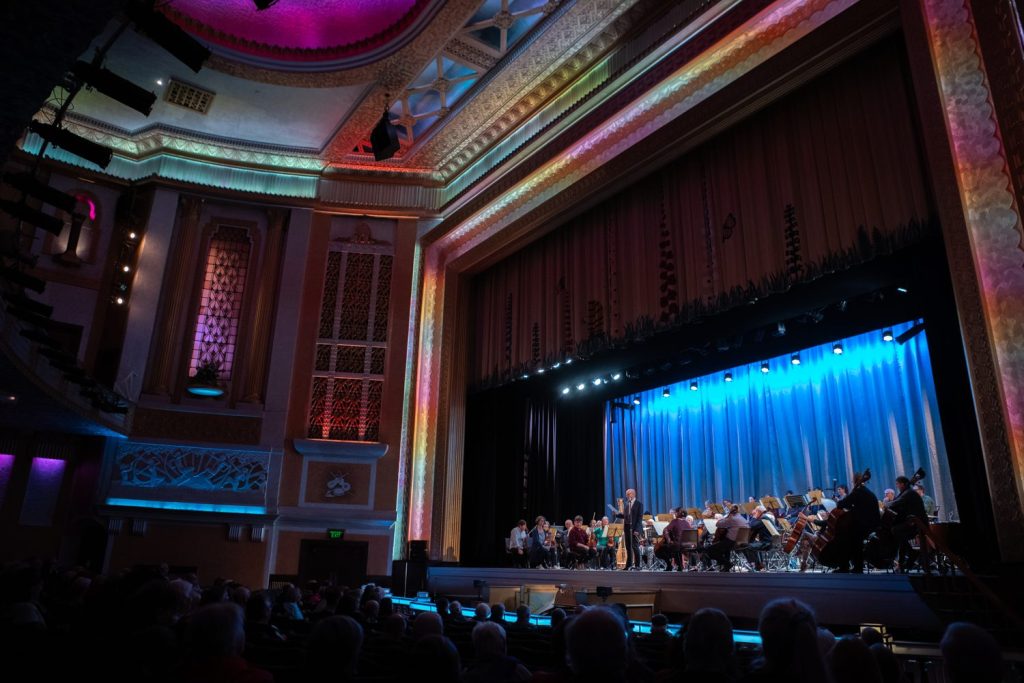
The Plaza’s survival of the 1960s remodelling of Stockport is a miracle, and it is today an asset in itself, besides its cultural output. Together with the ongoing regeneration of the town centre, the Plaza helps form the growing consensus that Stockport is on the up.
When people come to a concert, it needs to have a sense of occasion, Wilson tells me. “The audience will enjoy going in there, people love the building. If they’ve not been before, they will be wowed by it.”
But for now it’s down into the bellows of the theatre and along the white-washed passages to the dressing rooms. There is real atmosphere, hubbub and excitement in the air as the players tune their instruments and old faces catch up. The dress code is relaxed but Nick Simpson is suiting up for the occasion. Like most of the players, he normally works with more serious music, but finds he doesn’t mind the change of pace: “This kind of music has a broader appeal, and it’s very enjoyable to conduct. You look across the section, and you think, these are really good players, it doesn’t matter what we’re playing.”
Simpson is positive about the project, even though he thinks many of the seats will be filled by family and friends. The path into classical music is a virtuous circle, he says: “People in this orchestra will be not just participating in music, but they’ll pay to go and hear it as well.
“That has traditionally been the way in: you learned about it at school, and then took it with you all your life. But now we’re not producing instrumentalists, and I think partly because of that, we don’t have the audiences either.”
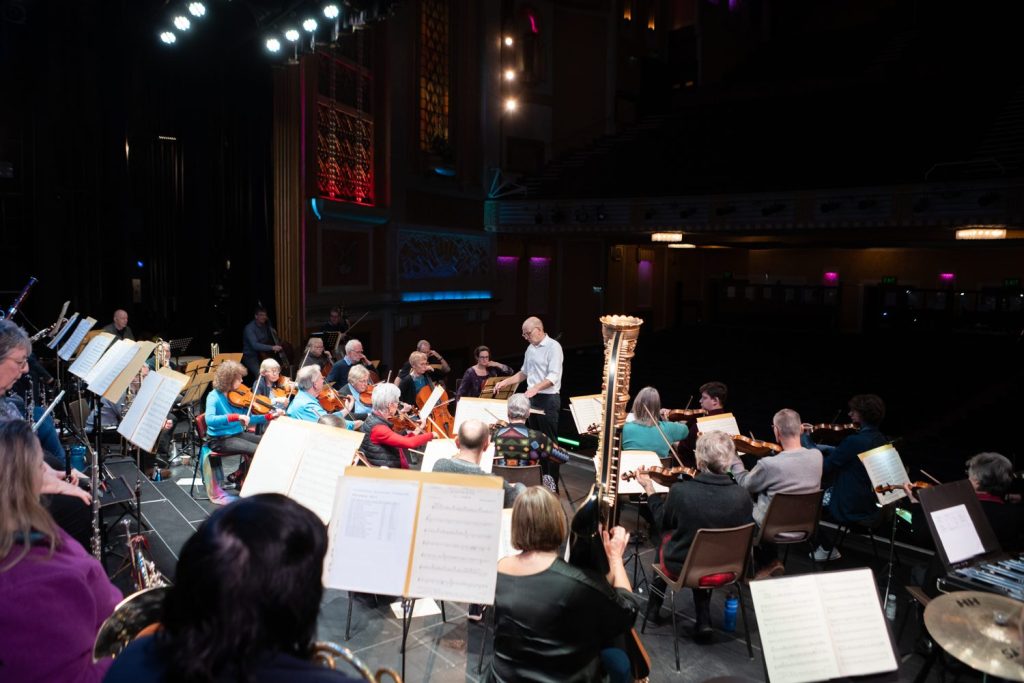
Cathy Gordon, one of the second violins, is optimistic: “I think people who normally wouldn’t go to a classical concert, a younger audience who might think this sort of music isn’t for them, would come to this. It’s shorter, more lighthearted, and the venue adds to it as well.”
Wendy Rangeley, first violinist, says her daughter and grandchildren will be attending: “None of my family are that keen on the music from the other orchestras I’m involved with, and can’t attend longer evening performances, so a Sunday at the Plaza is perfect for them.”
Before long, the lights have dimmed and the lower tier of the Plaza is almost full; the audience ranges from young children to care home residents and the mayor of Stockport himself. Final calculations indicate around 250 tickets sold, more than Wilson was hoping for and more than encouraging for a first performance.
And while this piece isn’t strictly a review of the performance, from the number of nodding heads, tapping feet and the warm applause at the end, suffice it to say that it was well received.
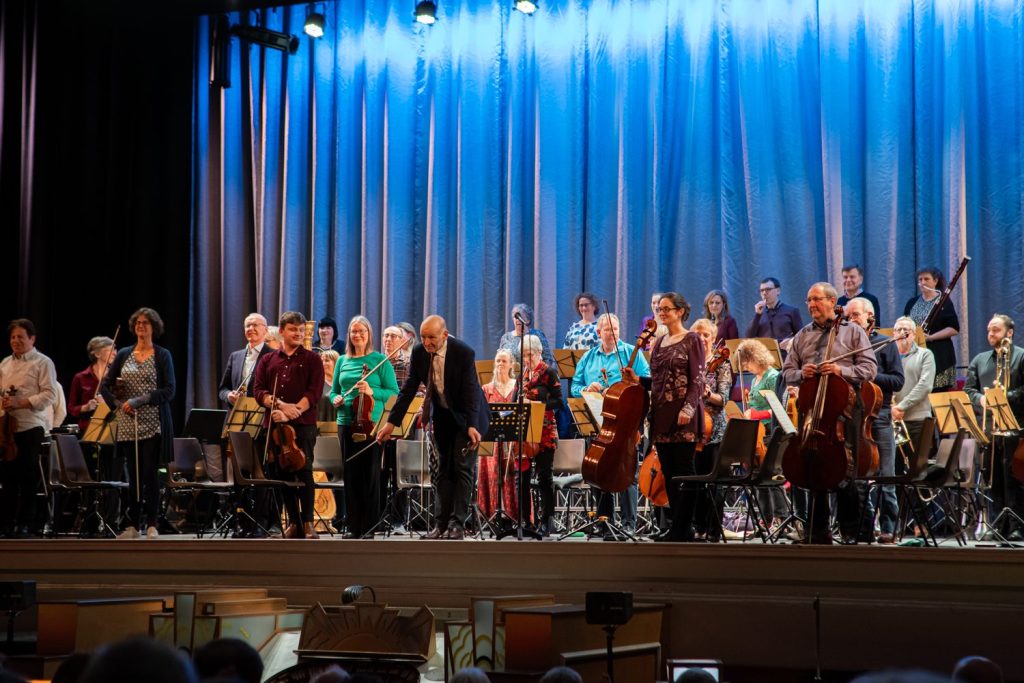
Featured Image: Michael Mannion
More information on the Pyramid Players can be found on their Facebook page.
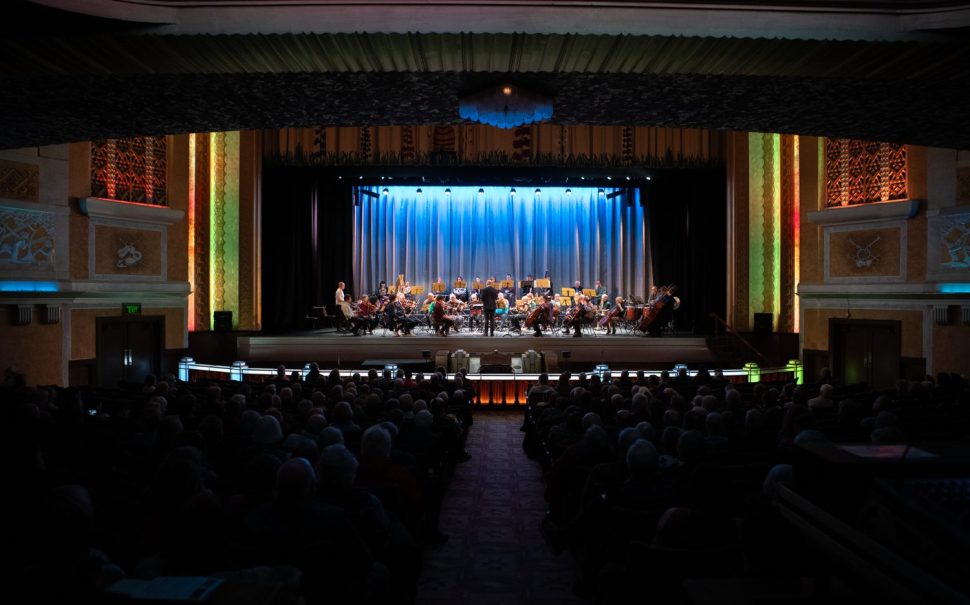

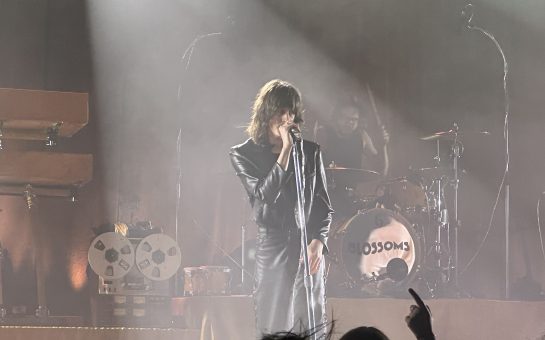
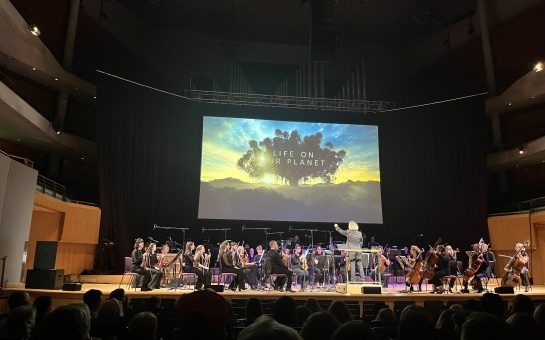
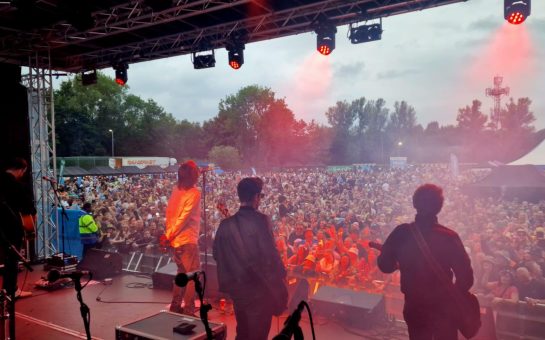
Join the discussion
I went to this concert. Absolutely fantastic. Love light music and have a number of CDs relating to this superb music. So pleased that this orchestra has been formed and in Stockport too. Wonderful. Many thanks. Looking forward to the next concert. 😃❤️
Thank-you, Greta, for the time you spent with the orchestra on the day. We know from the many messages received afterwards that our audience enjoyed the concert very much, and we shall be returning to Stockport Plaza for our second public performance on Sunday 29th of September. Best wishes, John Wilson
Well done John for creating this new wonderful orchestra, it was a most enjoyable concert which was very well received by the audience. Best wishes.
It was the first classical music orchestra I have been to and I loved it. The Plaza is a lovely theatre too. Looking forward to the next performance in September.